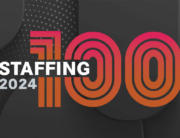No one argues with the idea that recessions make it more difficult to run a business. When consumers and corporations spend less money, employers lay off full-time employees and hire fewer contingent workers. That pressures staffing firms to keep their heads above water even while they plan how — if they’re smart — to reinvigorate their business once the recovery begins.
Today, after years of steady growth, a number of economists and business experts have expressed concern about some kind of downturn beginning during 2020. However, their opinions are far from unanimous.
On one hand, Wall Street’s performance demonstrates that investors believe the economy remains strong. The Dow Jones Industrial Average climbed more than 22% in 2019, while the S&P 500 rose nearly 29%.
Off the trading floor, business leaders remained optimistic as customers kept buying their products and services, according to Mike Boro, a New York-based partner with accounting and consulting firm PwC. His clients, who are active in industries ranging from consulting services and technology to manufacturing and entertainment, “see the market for their services or products as growing.”
On the other hand, some indicators hint at a slowdown. For example, the Institute for Supply Management’s US purchasing managers’ index dropped to 48.1% in November, down 0.2 points from October and signaling a contraction for the fourth straight month. And although 59% of small employers surveyed by MetLife and the US Chamber of Commerce felt positively about their local economies during 2019’s fourth quarter, the confidence of small manufacturers dropped 11 points over the second and third quarters because of concerns about the national economy.
“Normally [before a recession], we first start to see the trends a little bit like we’re seeing now, where manufacturing starts to soften a little bit,” says Debra Thorpe, Kelly Services’ senior VP and general manager of Americas operations. “Then, something of an economic magnitude happens,” such as the dot-com crash of 2000-2001 or the credit crisis of 2008. For today’s economy to fall into a full-blown recession, Thorpe believes, “we’d need to see another big, economic or socio-economic event.”
Recession’s Impact
While a recession can make finding the right mix of full-time and contingent staff more challenging, it can also provide organizations with “a little bit of cover” if they need to downsize, Boro observed. At the same time, downturns often allow businesses to better align their workforce with needed technology and skills, a critical consideration at a time when technology needs and skill sets are dramatically changing. “And, it allows you to find specialized resources for certain needs without long-term employment commitments,” Boro says.
Not surprisingly, many industry experts say a downturn’s pain will be felt primarily among direct-hire practices. When companies face a recession, that’s one of the first areas they cut back on, says Brian Pugh, vice president of IT services and staffing for AgreeYa Solutions in Folsom, California. “What they’ll do typically at the first sign of a pullback is suspend those hiring budgets, and right with that goes the suspension of being able to pay a fee,” he says. Conversely, the contract-services business has traditionally been more insulated from downturns. During the slowdown of the early 2000s, contract services “may have lulled a bit, but really began jumping again as early as 2003,” Pugh recalls.
Another thing to consider is that even in a recession, businesses have work to do — and they need people to do it. Companies will always fund mission critical positions, Pugh says, “so there will still be fee money to be had. It’s just going to be a little bit more selective.” He believes staffing firms will continue to do a strong business with professional services contractors in areas such as technology, finance, accounting, engineering and science. “Demand for those skill sets is at an all-time high,” he says, “and I don’t see that demand pulling back to a point where active job seekers don’t have luck finding a role.”
At the same time, general staffing positions — such as those in administration or light industrial work — will generate less revenue as more low-skilled workers enter the market, demand for their services falls and employers find they can fill those jobs without a staffing firm’s assistance.
Think Long-Term
Maurice Fuller, founder and CEO of the StaffingTec Conference & Expo, suggests staffing agencies prepare for a downturn in two ways.
The first may be obvious: Protect your profit streams. “If you have too much overhead relative to the volume of job orders, then you should have some sort of plan for how you’re going to downsize your staffing firm,” he says. “You’ll need to downsize the number of recruiters you have and you’ll need to downsize on the sales side.”
However, there’s a balance to strike. “Some recessions are fairly short-lived,” Fuller observes. “So, if you downsize very, very rapidly and take out big chunks of your sales force, when the economy picks back up again and you don’t have resources on the ground, you may lose an opportunity to grow market share.”
That brings us to his second preparedness point: Recessions offer staffing firms “an incredible opportunity to pick up market share,” and they should prepare for downturns with that in mind. His reasoning is simple: Because fewer agencies stay in touch with employers that aren’t adding workers, those that do can build relationships and position themselves for better times and the resumption of hiring.
When the economy’s strong, hiring managers field multiple calls from suppliers even as they try to keep up with other responsibilities. As those calls dwindle, they’re more available to talk to you, Fuller says. Staffing agencies that connect with them have “a golden opportunity” to reset their business relationship because managers have more time to engage and consider ways to take advantage of their services. When business picks up again, Fuller says, “you’ll be the first in line.”
At the same time, staffing agencies should carefully consider what value they offer clients and how they can add to it. “The question is how do they add value if they’re more expensive than going direct?” PwC’s Boro says.
One way they add value is by mitigating employment risk. When an agency offers benefits and handles discipline and other administrative responsibilities, it both relieves the employer’s burdens and provides employees with a sense of belonging.
Another advantage agencies offer is their ability to be nimble with their talent pools. Staffing firms “should have a good understanding of the talent and skill sets they offer but must be ready to respond to the dynamics of companies who hire outside of staffing agencies or build their own candidate pools,” Boro says. Having specific talents available and accessible can save employers the challenges involved with going to the open markets by themselves. For staffing firms, that means knowing the talent you have and how best to suit them up.
Always Be Flexible
All this means flexibility is important to navigating a recession. But remember that in today’s era of quickly evolving technology and work, flexibility’s an important component of succeeding throughout the economy’s general rises and falls. “I think the savvy companies that survive recessions are the ones who have built a resilient operating model,” Kelly Service’s Thorpe says.
Technology plays a key role here, she believes. Staffing firms that leverage technology to allow their professionals to recruit from anywhere “are going to be the companies that weather the recession stronger than others that have maybe stayed with their traditional model.”
And be sure to apply the idea of flexible operations to how your staffing firm develops its own workforce. That means staffing should be practicing what it preaches, using flexible labor and flexible recruiting “that helps us through the ebbs and flows and cyclicality of our normal business,” Thorpe says. “The staffing companies that can show that they’ve built a resilient model, one that’s less reliant on brick-and-mortar and more reliant on technology and coverage, are going to be the ones that come out strong in the end.”







